Meet Rebecca Smith: Native-Latinx-owned Ice Queen offers sweet solace during COVID-19
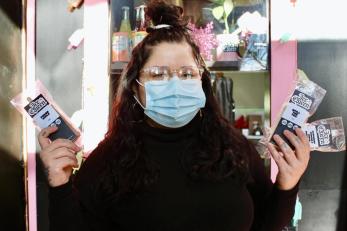
In the last decade, Portland has become the U.S. capital of food cart pods, bicyclists, craft breweries and naturally, home to the world’s first vegan mini-mall. Rebecca Smith frequented the aisle of shops on Southeast Stark Street for years, admiring the support and surfeit of options for alternative living by businesses like Food Fight!, Herbivore, Sweatpea Baking Co. and Scapegoat Tattoo. Now ten years since her move to Portland from the Bay Area and amidst a global pandemic, Rebecca’s life took a surreal turn when she opened the world’s only all-vegan popsicle shop on the famed vegan strip: Ice Queen.
Pre-pandemic, Rebecca—who is ethnically Native, Latinx and Irish—transitioned as a student in Portland State University’s Indigenous Nations Studies program to working as an in-home caregiver. She then eventually made her way to jobs in local vegan food establishments. “I really enjoyed working in kitchens, but I quickly learned how under-appreciated the staff are,” Rebecca said. “There’s something toxic to kitchen environments where it’s usually all about work harder, faster, no breaks. From there, I knew I wanted to start my own business that valued people.”
Rebecca brainstormed around her first business idea—a hybrid café-ice cream shop—and took it with her to Mercy Corps Northwest’s Business Foundations classes. During the six-week course that offers basics for launching a small business, Rebecca realized she was more motivated about the possibilities with creating ice cream and less about the actual café. She loved the joy and comfort ice cream brings to everyone of all ages and backgrounds.
“I love sweets. They make me happy just like anyone else. I love everything cute, glittery and covered in sparkles, so it just made sense to make ice cream,” Rebecca said. “Mercy Corps straight up changed my life and got me to a place mentally where I felt like I could do this.” She indulged the concept and simultaneously applied for and received a small business grant (IDA) from Mercy Corps Northwest.
“The IDA grant I got a few years ago changed everything. It was the first time I got to invest in the business,” Rebecca said. “Before that, I sold half my record collection to afford things. But with that $5,000, I was able to buy my first ice cream machine and quality coolers – limited-edition pink Yetis to be exact.”
To brand her business, Rebecca pulled inspiration from life in California where Chicano identity runs strong. Bubblegum pink and Old English font together became the Ice Queen brand’s modus operandi. Childhood snacks from neighborhood Latinx grocery stores translated into plant-based flavors like Chamoy-mango Mangonada, Toasted Coconut and Oatchata. Recreating Chicano experiences in her desserts felt natural for Rebecca, but she was cautious not to overstep from the start.
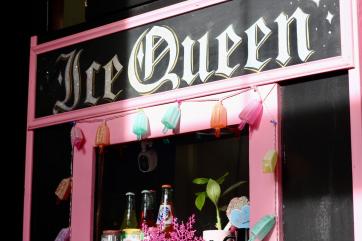
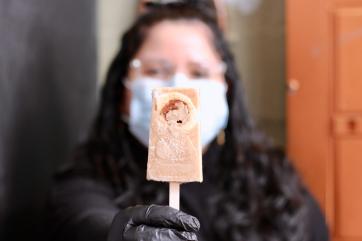
Unique flavors with organic ingredients
“There’s a fine line when incorporating your culture into your business. There’s a point where subtle notes here and there can get exploitive,” Rebecca said. “I try really consciously to walk in between the two.”
Rebecca’s unique flavors and “cute” aesthetic caught the public’s eye, and Ice Queen soon took off at events around Portland, including music festivals and even Mercy Corps gatherings. However, Ice Queen’s widespread popularity was met with its own technical issues. Keeping up with demand without an industrial-sized ice cream machine was one challenge. The varying indoor and outdoor temperatures also did not bode well for the meltable merchandise.
“I knew I just needed to embrace the popsicle at that point,” Rebecca said.
More versatile and efficient to make at any quantity—whether she was whipping up a small sample size or a large wholesale batch—Rebecca made the decision to solely produce popsicles. Logistical snags now aside, Rebecca could focus on what she cared for most: the flavors. Ice Queen flavors are each developed with intention, creativity and often with locally sourced and organic ingredients.
“I really like to push boundaries with people’s perceptions of what a popsicle is,” Rebecca said. “Take the cinnamon bun popsicle. I think, ‘What can I do with a bun? Well, I’ve never seen a popsicle with a cinnamon bun inside of it, so let’s just try it.’ It’s all spur of the moment and we see what happens.”
As Rebecca quickly became known as Portland’s premier popsiclière, everything came to a startling halt when COVID‑19 ravaged the world.
The virus affected life in Oregon beginning in March of 2020. The state shut down for weeks, followed by fluctuating countywide pauses and restrictions. Businesses closed and many never reopened, including small businesses that couldn’t financially endure the volatile situation.
Like most places, Multnomah County bid adieu to large events, including highly anticipated concerts, festivals and popups—everywhere Ice Queen was sold.
Delivery options became the food service industry’s salvation during the closures. Rebecca took a chance and as she continued fulfilling wholesale requests for local grocers, she advertised a new small-scale offer for delivery—ten Ice Queen popsicles for $30. Online orders steadily came through, but emblematic of Portland culture and Ice Queen’s loyal fanbase, requests soon became overwhelming and Rebecca had to make an expedited decision.
“The store just kind of had to happen if I was going to continue my business,” Rebecca said. “I am very grateful that so many people came together to help me get this space during this time. It’s been really interesting, sad, happy and just a mix of emotions. It’s bittersweet because I know so many others are struggling. It’s weird to celebrate.”
As of July of 2020, Rebecca’s mostly plant milk-based popsicles are now made in a nearby commissary kitchen and sold at her shop window along the vegan mini-mall at 1223 Southeast Stark Street. She has since been able to hire two additional employees to support the two locations.
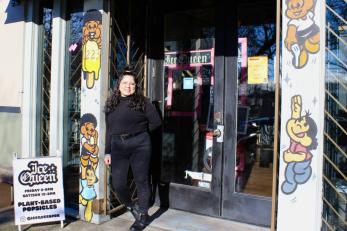
Sweet success
Rebecca reports: “All in all, I’ve made out OK being that I opened a walkup window for popsicles in COVID-19 and I still don’t have a proper sign on my storefront.” She credits her business success to social media, rampant word of mouth and her strong community involvement with organizations like Mercy Corps, Built Oregon and the Native American Youth and Family Center (NAYA), in addition to her community of fellow vegan business owners.
As for her personal success, Rebecca feels fulfilled at the sheer thought of brightening people’s days with her sweet (and sometimes spicy) treats.
“I’m probably not going to change the world, but I think you can have an impact on someone’s day-to-day life,” Rebecca said. “For me and I know for other people too, the experience of going to get ice cream is always positive, happy. It allows you to step away from whatever else is going on in your life—like a deadly pandemic—for even just a few minutes and that makes a difference.”
Rebecca is also pleased with her family’s newfound excitement and support for Ice Queen now that she owns her own storefront.
“My dad is my number one fan, and the whole family has finally come around to knowing that I am actually serious about my business, and it’s not just an idea. As regular working people, the idea of owning a business is really outside of their realm of possibilities,” Rebecca said. “Growing up, we always thought it was this special kind of person who owned a business. So for them, they had to accept that I was willing to risk stability for this… And now I know that it isn’t just a special type of person who owns a business. Anyone could own a business.”
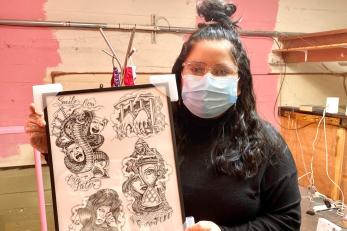
Expanding the business
Ice Queen is en route to grow from a walkup window to becoming a full frozen dessert shop later this spring, eventually selling both plant-based popsicles and ice cream. Rebecca and team are currently on a mission to effectively incorporate the Ice Queen branding into the physical space in a way “that’s not cheesy or minimalist and beige, but fun like an ice cream joint should be.” Her personal office will be in the lofted area above the shop with floor to ceiling pink walls adorned with sketches by West Coast Chicano tattoo artist Chuco Moreno.
Ice Queen accepted donations via GoFundMe in 2021. The fundraiser helped with purchasing essentials like large refrigerators and freezers, plumbing, permits and more. Rebecca shares that any support—whether a donation, a visit to the window or a well wish—is much appreciated.
Ice Queen is currently open Fridays 2-6 p.m. and Saturdays/Sundays 12-6 p.m. Visit Ice Queen on Instagram for the latest news and shop hours.